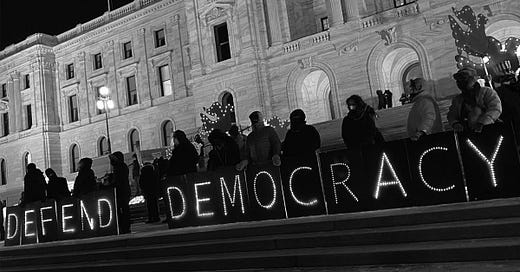Topic #1: Grifters & The Resistance
This week, Taylor Lorenz of User Mag published a YouTube video entitled “The Rise and Fall of ‘the Resistance’”. At 25 minutes of run time, it’s worth a watch. It touches on topics we’ve been discussing: what happened to all those Trump 45 “resistors”, what role did the Biden administration play in minimizing progressive movements, and how do we amplify real journalists and activist voices vs. those creating anti-Trump content slop to feed the outrage cycle?
A Quick Summary
The Trump 45 “Resistance” thrived on social media, was fueled by conspiracies (e.g., Russiagate), performative protest, liberal memes, merch, and symbolic resistance (like #Resist hashtags). Many of the influencers that benefited from this media environment were former conservatives or reactionaries, some who have not pivoted back to pro-Trump rhetoric as power has shifted. Further, the Democratic Party sidelined true progressive movements like BLM, climate justice, and public health advocacy, going as far as embracing right-wing policies like US border militarization and military support for Human Rights violation by the Israeli government. This time, we can’t let influencers misdirect our energy towards faux outrage and online likes. We need to build a movement focused on class solidarity and durable, community-based power.
Ongoing Commitment:
To get you started, consider plugging into the local chapters of national organizations. Here are some suggestions:
Indivisible: Indivisible is a grassroots movement dedicated to building progressive power and holding elected officials accountable. With local chapters nationwide, Indivisible provides resources and support for community-based activism. Indivisible
Working Families Party (WFP): The Working Families Party is a multiracial political organization that fights for workers over bosses and people over the powerful. They aim to build a nation that realizes the promise of freedom and equality for all. Working Families Party
Democratic Socialists of America (DSA): The DSA is a political organization that advocates for democratic socialism in the United States. With chapters across the country, they engage in various campaigns, including labor organizing, public housing, and healthcare reform. DSA
Progressive Democrats of America (PDA): Founded in 2004, PDA seeks to transform the Democratic Party and the country by advocating for progressive policies. They have local chapters that focus on issues like healthcare, economic justice, and environmental sustainability. Progressive Democrats of America - PDA
Common Cause: Common Cause is a nonpartisan organization dedicated to upholding the core values of American democracy. With over 1.5 million members, they work to create an open, honest, and accountable government that serves the public interest.
PFLAG: PFLAG is the first and largest organization for LGBTQ+ people, their parents and families, and allies. With nearly 400 chapters across the United States, PFLAG provides support, education, and advocacy. PFLAG
American Constitution Society (ACS): ACS is a progressive legal organization with more than 200 chapters across the country. They aim to ensure that law is a force for improving the lives of all people. ACS
MoveOn: MoveOn is a people-powered platform that champions progressive values and works to build a more inclusive and progressive future. They mobilize members to support campaigns and causes that matter to their communities. MoveOn
Center for Popular Democracy (CPD): CPD is an advocacy group that promotes progressive politics. As a federation of groups, including former ACORN chapters, they envision and work towards a pro-worker, pro-immigrant, racial, and economic justice agenda. Wikipedia
Drinking Liberally: Drinking Liberally is a social organization where liberals and progressives gather in bars to socialize and discuss politics. With chapters across the country, it provides a welcoming environment for political discussion and networking. Wikipedia
These organizations offer various opportunities for engagement, from policy advocacy to community organizing. Joining a local chapter can be a meaningful way to connect with like-minded individuals and contribute to causes you care about.
Topic #2: Democracy for All
As we strive for a truly democratic nation, we must shift our focus from the interests of corporations and billionaires, to the interests of the working class. If we want to remain a democratic country, we must regain the collective power of the people. The ruling class is fueled by greed and has repeatedly demonstrated that their values prioritize power and profit above all else. True democratic progress comes from bottom-up movements, grassroots organizing, and policies that benefit the many, not just the few. It's time to reclaim our democracy from the grip of oligarchs and build a society that works for all, not just the wealthy elite.
Working-class Americans are seeking:
Higher wages and better working conditions
Stronger labor protections and union rights
More equitable distribution of wealth and resources
The ruling-class Americans are seeking:
Wealth extraction using exploitation of labor and monopolies
Political influence for tax avoidance and legal immunity
Media control and shaping the public opinion
What To Do If You Have:
5 Minutes:
Email your representatives to protect voter access by voting NO on the SAVE Act.
An Afternoon:
Fighting the Oligarchy Tour: Bernie Sanders, along with figures like AOC and Tim Walz, are holding events across the country to engage in discussions about how to challenge the influence of oligarchs and corporate interests. These events aim to mobilize people and promote a progressive agenda.
Attend an Event: If you are near one of the tour locations, RSVP to join the discussion.
Tune in Live: If you cannot attend in person, watch the events live.
Attend a Protest: Check your local grassroots organizations and make a plan to attend a protest. Can’t find one? Protest outside a Tesla dealership.
Closing Thoughts
“We live in a world in which we need to share responsibility. It’s easy to say ‘It’s not my child, not my community, not my world, not my problem.’ Then there are those who see the need and respond. I consider those people my heroes.” Fred Rogers



